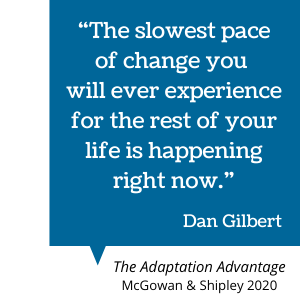Have you ever had a teacher you enjoyed so much, or a subject that captured your interest so fully, that you gave that homework your absolute all? I hope so. That experience suggests that we dive into learning what we like.
Building on that assumption, lately I’ve been exploring how we can enjoy change more. We all have to adapt — will we be more likely to do it with ease and enthusiasm if we like it? And therefore, are there ways to learn to relish it more?
In So Good They Can’t Ignore You, Cal Newport warns against pursuing your passion and instead argues for becoming passionate about something as a result of learning a lot about it. Mastery builds enthusiasm, not the other way around. We like what we learn.
Adam Grant explores a similar theme in his excellent new book, Think Again. He points to the fact that students report preferring lectures, but they gain more knowledge and skill from active learning sessions. More mental effort is less fun but leads to deeper understanding.
The active learning sessions he describes incorporate dialogue, scrutiny, disagreement, questioning and thinking for ourselves. Not passive, to be sure, but could also be enjoyable?! This research is more about the learning process than subject matter. It’s why, as a facilitator, I’m committed to achieving both experiential and content objectives with groups.
I’m not sure if the sequence of liking and learning matter, but I am confident that they don’t have to work at cross purposes. We’ve definitely found a sweet spot when they’re both at play.
Back to adaptability: people who are good at it are also energized by it. And we know energy is at a premium these days. So, if we can learn to be more adaptable — and it is a learnable set of skills — then adaptability can actually recharge our battery rather than deplete it. Imagine being told you have to adapt to one more thing and getting a twinkle in your eyes rather than rolling them!

If you’re interested in learning more about measuring and increasing your Adaptability Quotient, I’d be happy to talk to you about it.
